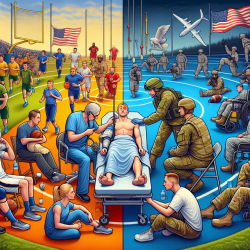Unlock the Secret to Better Concussion Management: Lessons from Sports and Military Concussions
Concussions, often regarded as mild traumatic brain injuries (mTBIs), can have significant and long-lasting effects if not properly managed. The research article "Mild Traumatic Brain Injury: Lessons Learned from Clinical, Sports, and Combat Concussions" provides critical insights into the mechanisms and management of concussions. This blog explores how practitioners can implement these findings to enhance their skills and improve patient outcomes.
The Sports as a Laboratory Assessment Model (SLAM)
The SLAM model, developed at the University of Virginia, uses contact sports as a controlled environment to study concussions. This model involves baseline neurocognitive testing of athletes, which is repeated post-concussion to assess recovery. The findings indicate a typical recovery curve in young, healthy athletes, which has informed concussion management protocols worldwide.
Practitioners can leverage this model by incorporating baseline assessments in their practice, allowing for more accurate post-injury evaluations and tailored recovery plans. This approach is particularly beneficial in preventing severe consequences, such as second impact syndrome, by ensuring athletes do not return to play prematurely.
Applying SLAM to Military Concussions
The military has adopted the SLAM methodology to manage combat-related concussions, which often result from blast injuries. The Military Acute Concussion Evaluation (MACE) and the Automated Neuropsychological Assessment Metric (ANAM) are used to assess and manage these injuries. By applying lessons from sports, the military has developed guidelines for safe return-to-duty decisions, emphasizing rest and gradual reintroduction to activities.
For practitioners working with military personnel or veterans, understanding these guidelines can enhance treatment plans and support better recovery outcomes. Additionally, recognizing the unique stressors faced by military patients, such as PTSD, is crucial for effective management.
The Role of Cognitive Behavioral Therapy (CBT)
CBT has proven effective in treating post-concussion symptoms, including anxiety and depression. The research highlights its success in both sports and military settings, suggesting that practitioners incorporate CBT into their treatment protocols. Modifying CBT to accommodate cognitive impairments can further enhance its effectiveness.
By addressing emotional and cognitive symptoms early, practitioners can prevent long-term sequelae and improve the quality of life for patients with mTBI. Encouraging further research into CBT's applications can lead to more refined and effective treatment strategies.
Conclusion
The insights gained from studying sports and military concussions offer valuable lessons for practitioners. By implementing baseline assessments, understanding military guidelines, and incorporating CBT, practitioners can significantly improve concussion management. These strategies not only enhance recovery but also prevent long-term complications.
For those interested in delving deeper into the research, the original article provides a comprehensive overview of the findings and their applications. Mild Traumatic Brain Injury: Lessons Learned from Clinical, Sports, and Combat Concussions.










